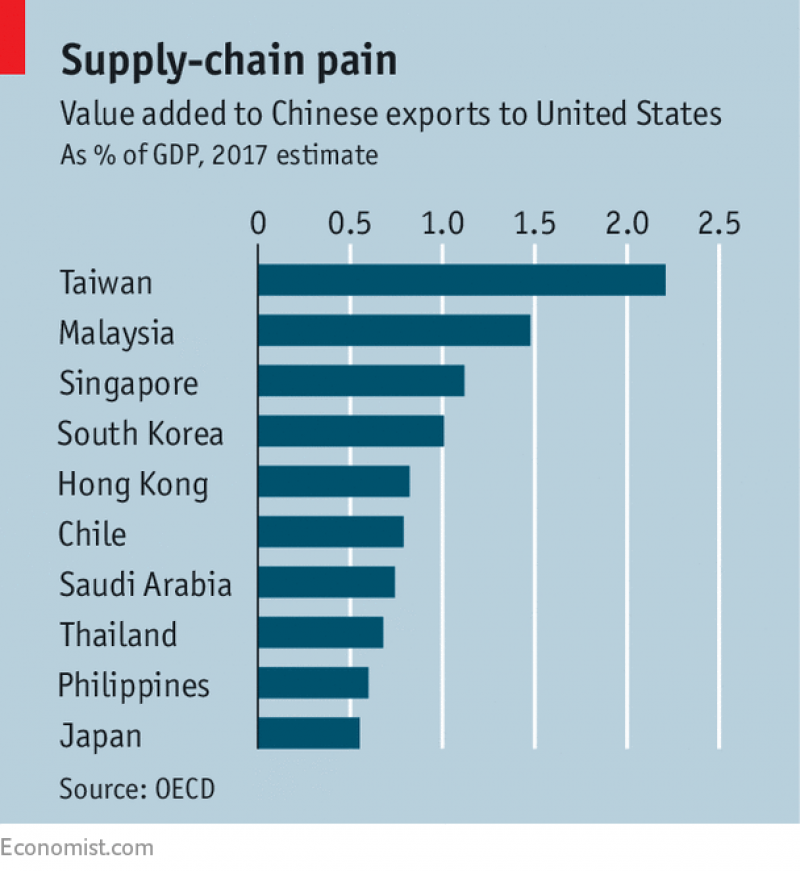If the trade war between the United States of America (USA) and China gains further steam, it may deal a nasty blow to the en bloc mania. On Thursday, the President of the USA doubled down on the potential trade war with China. He was responding to the Chinese announcement that $50 billion in American products would be hit by tariffs – including soybeans and pork.
China’s announcement was a tit-for-tat move against the Trump Administration which had earlier slapped a 25 percent tariff on Chinese products in a sweeping trade measure aimed at penalizing the country for its trade practices.
Trump condemned the Chinese measures and described it as a move to harm USA’s manufacturers and farmers.
“Rather than remedy its misconduct, China has chosen to harm our farmers and manufacturers.” – Trump
Table of Contents
He said that he had instructed his trade representative to determine whether tariffs on an additional $100 billion in goods were warranted and, “if so, to identify the products upon which to impose such tariffs.”
If a trade war indeed breaks out between the USA and China, Singapore will be caught in the middle and the en bloc mania will certainly come to an end.
A recent Economist article pointed out that Asia’s small and open economies may suffer the most in America’s trade war with China. The article said “30% of the value of the goods China exports to America is added elsewhere”, and that “if the row escalates, countries entwined in Chinese supply chains will suffer.”
In a chart the article carried to illustrate its point, Singapore was listed at 3rd place for value-added services to Chinese exports to USA, as a percentage of the GDP.

Singapore is part of “China’s great export machine” that Trump is hell-bent on destroying. The percentage of GDP (Gross Domestic Product) our exports add value to China’s exports to the USA suggests that if the war of words between the two giants erupt into a real trade war, we will be caught in the middle.
A trade war among other things, will drive up inflation levels in the USA and push the US dollar to be stronger. Both these measures will pose mounting challenges for those that are fueling the en bloc mania – including property investors, speculators, developers and the banks financing them.
In the midst of this risk, a letter writer to the Straits Times has suggested that the government should tweak collective sale rules to prevent en bloc mania and to avoid dislocation in market.
The writer, Gerwin Gerke, said “once a development starts the process for a collective sale, the flats there are no longer put up for sale” and that “properties have thus become unavailable in many older developments.”
https://www.icompareloan.com/resources/en-bloc-law-prevent-majoritarianism/
The writer suggested that the Government adopt the following measures to counter the en bloc mania.
“
- More owners should support selling en bloc before a collective sale committee is formed to kick-start the process. If the law requires that at least 80 per cent of owners must consent to sell en bloc, why should the process start on the back of only 25 per cent interest? Why not require 50 per cent or 60 per cent? And, why are voices against a sale not counted? If more than 20 per cent register disapproval at this stage, why even start the process?
- The meetings to start the collective sale process require a quorum of owners holding 30 per cent of share value, and just a simple majority to pass the resolution. This means that all it takes is about 17 per cent of share value holders to get the collective sale process going, thus effectively taking the development off the market.
- The collection of signatures currently extends to 12 months. If there was majority support for the move, is such a long period necessary?
- The “no sale, no fee” condition for the marketing agent and lawyers creates warped incentives. Why not require some mandatory upfront payment to them, which will cause more serious thinking as to whether there is an actual majority to warrant going the collective sale route?”
En bloc laws have been faulted for giving Majority owners the right to sell away their property without the signature of the Minority owners and force them to be a party to Collective Sales Agreement against their will. But Minister for National Development Lawrence Wong recently gave the assurance that safeguards are in place for en bloc sales.
“The main objective of the collective sales framework is to give owners the choice on whether to go for redevelopment. Such redevelopment allows rejuvenation and land use optimisation in residential developments,” said Mr Wong.
“The Land Titles (Strata) Act requires buildings less than 10 years old to obtain 90 per cent consent from owners before allowing the collective sale to go through, compared to 80 per cent for older developments,” the Minister added, explaining how the collective sales framework imposes higher consent thresholds for newer developments.
https://www.icompareloan.com/resources/minister-national-development-assures-safeguards-place-en-bloc-sales/
—
To read up more on property buying in Singapore to know what is noise and what is real. Or click here for the Ultimate Guide on Property Buying in Singapore.
Read about the En bloc sales process here: –
https://www.icompareloan.com/en-bloc-sales-process-guide-singapore/






